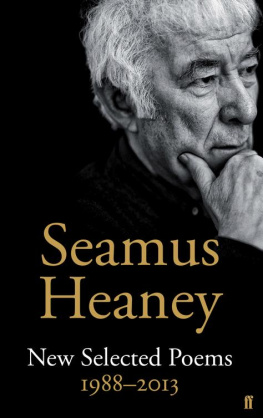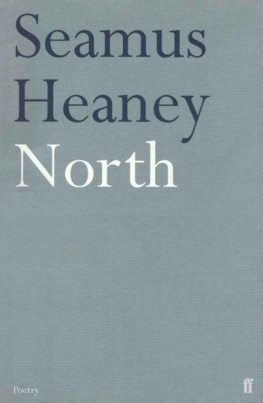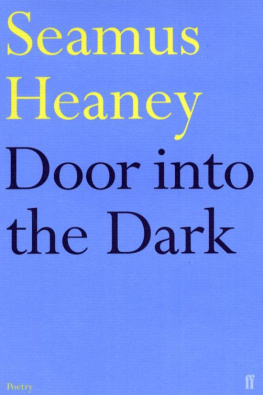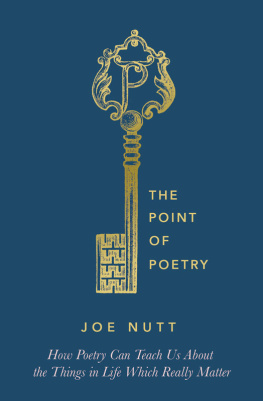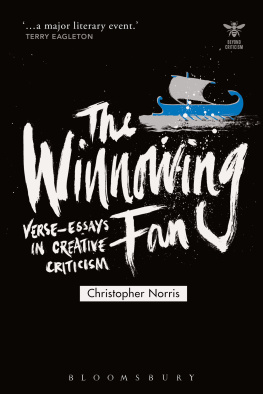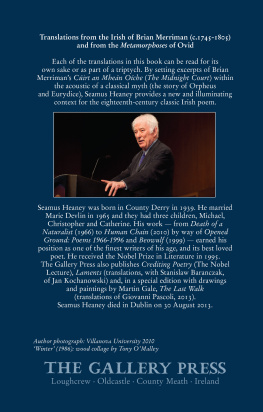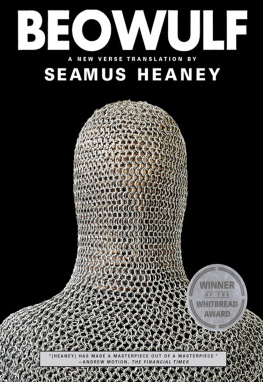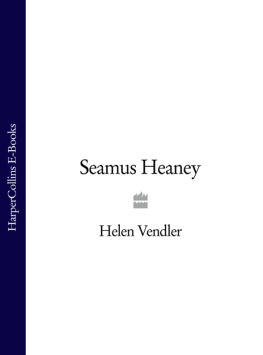Seamus Heaney - The Redress of Poetry
Here you can read online Seamus Heaney - The Redress of Poetry full text of the book (entire story) in english for free. Download pdf and epub, get meaning, cover and reviews about this ebook. year: 1996, publisher: Farrar, Straus and Giroux, genre: Science. Description of the work, (preface) as well as reviews are available. Best literature library LitArk.com created for fans of good reading and offers a wide selection of genres:
Romance novel
Science fiction
Adventure
Detective
Science
History
Home and family
Prose
Art
Politics
Computer
Non-fiction
Religion
Business
Children
Humor
Choose a favorite category and find really read worthwhile books. Enjoy immersion in the world of imagination, feel the emotions of the characters or learn something new for yourself, make an fascinating discovery.

- Book:The Redress of Poetry
- Author:
- Publisher:Farrar, Straus and Giroux
- Genre:
- Year:1996
- Rating:4 / 5
- Favourites:Add to favourites
- Your mark:
- 80
- 1
- 2
- 3
- 4
- 5
The Redress of Poetry: summary, description and annotation
We offer to read an annotation, description, summary or preface (depends on what the author of the book "The Redress of Poetry" wrote himself). If you haven't found the necessary information about the book — write in the comments, we will try to find it.
Seamus Heaney defines the title of this work of criticism as follows: To redress poetry is to know and celebrate it for its forcibleness as itself . . . not only as a matter of profferd argument and edifying content but as a matter of angelic potential, a motion of the soul. Throughout this collection, Heaneys insight and eloquence are themselves of a poetic order.
The Redress of Poetry — read online for free the complete book (whole text) full work
Below is the text of the book, divided by pages. System saving the place of the last page read, allows you to conveniently read the book "The Redress of Poetry" online for free, without having to search again every time where you left off. Put a bookmark, and you can go to the page where you finished reading at any time.
Font size:
Interval:
Bookmark:

The author and publisher have provided this e-book to you for your personal use only. You may not make this e-book publicly available in any way. Copyright infringement is against the law. If you believe the copy of this e-book you are reading infringes on the authors copyright, please notify the publisher at: us.macmillanusa.com/piracy.
Contents
for Bernard and Heather ODonoghue
Preface
The ten lectures reprinted here were first delivered in the course of my tenure as Professor of Poetry at Oxford between 1989 and 1994. It was an honour to be elected to the office and to be welcomed so wholeheartedly within the university. My predecessor, Peter Levi, wrote me a wonderful letter at the time, with all kinds of practical advice and an especially promising pen-and-ink sketch of the proper academic rig-out for Encaenia. It was typical of the good cheer and good reception I experienced in Oxford from the start, although I should also acknowledge here the warmth with which the appointment was greeted in Ireland. Perhaps the best example of the latter was a woman with a pram who was crossing the road at traffic lights in Omagh a couple of days after the result had been announced: she recognized me at the wheel of the car, gave me a quick unsmiling nod, a very definite thumbs-up, and then hurried smartly on about her business.
The Professor of Poetry is expected to deliver three public lectures each year: five of the fifteen I gave have been left out of this collection. A large part of one of them (on Louis MacNeice) is included in Frontiers of Writing and one on Robert Frost (with specific reference to the theme of redress) is available in the twenty-fifth anniversary issue of Salmagundi (No. 8889, Fall 1990Winter 1991). The three contributed during my second year made up a triptych called Talking Shop: two of these were an extended treatment of concerns I deal with briefly in the Introduction to this book, and the third was a survey of the work of several younger Irish poets in the light of those same concerns. In the end, however, it seemed to me that that group of three was different in kind from the ten reprinted here, all of which focus upon a single work or a completed oeuvre by poets in the English, Irish and American canons.
The pieces that follow have been revised since they were delivered; there have been excisions and are one or two additions, but none of the arguments or judgements made on the original occasions has been altered. In some cases, important new books on the poets concerned appeared after the lectures were given such as Brett Hilliers biography of Elizabeth Bishop, and Davis Coakleys book emphasizing the Irish dimension in Oscar Wilde but their findings in general were a corroboration of the things I had been saying. In the case of Frontiers of Writing, however, I was definitely tempted to rewrite since it was delivered late in 1993, almost a year before the ceasefires by the Provisional IRA and the Loyalist paramilitaries, at a time when the mood in Britain and Ireland had been greatly darkened by bombing atrocities on the Shankhill Road and at Greysteel. I nevertheless decided to leave it unchanged because it had been deliberately composed as a concluding statement and also because many of the things I say there still hold good.
In the meantime, some of the lectures were repeated elsewhere and some of them have been published separately, beginning with The Redress of Poetry, which appeared as a pamphlet from Oxford University Press in 1990. Extending the Alphabet was delivered in May 1993 as the E. J. Pratt Memorial Lecture at Memorial University in Newfoundland; Orpheus in Ireland was published in The Southern Review, Vol. 32, No. 3, Summer 1995; John Clares Prog was included (as John Clare A Bicentenary Lecture) in John Clare in Context, edited by Hugh Haughton, Adam Phillips and Geoffrey Summerfield, Cambridge University Press, 1994; Speranza in Reading was given as the 1994 James McAuley Lecture in the University of Tasmania; A Torchlight Procession of One was the R. I. Best Memorial Lecture, sponsored by the National Library of Ireland, in January 1993; Dylan the Durable? was the 1992 Ben Belitt Lecture at Bennington College and appeared as a Bennington Chapbook; Joy or Night was given as the W. D. Thomas Lecture at the University of Swansea in January 1993; and Frontiers of Writing was carried in the first issue of Bullan, An Irish Studies Journal, published from St Johns College, Oxford. Extracts from a number of the lectures appeared in Harvard Review. I am grateful to the sponsors of all these events and to the editors and publishers who saw the lectures into print in their original form. At a later stage, Christopher Reid and Jane Feaver, my editors at Faber and Faber, were as usual generous beyond measure with their gifts as readers and (re)writers.
My chief gratitude, however, must go to my friends in Oxford and to all those other hearers and hearteners of the work who stayed the course. Since the experience of lecturing in the Examination Schools was not only honorific but daunting, it was always a relief to meet the supportive faces that one had met in the audience again, after the event, in the bar of the East Gate Hotel: bitter has never tasted sweeter. In more formal circumstances, the hospitality of the President and Fellows of Magdalen College and the President and Fellows of St Johns made every visit a special occasion for my wife and myself: Anthony Smith gave us a home from home in the Presidents Lodgings at Magdalen and kept on finding ways to improve the surroundings in a suite that was already a joy to inhabit. I shall always remember the delight of waking up there on autumn mornings just as the sopranos of the college choir were beginning to run through their scales in the practice room below.
In Magdalen also I was untiringly guided and assisted in Oxford ways and means by Bernard ODonoghue: whether it was a matter of accessing catalogues in the Bodleian or a play at Stratford, the Thames at Bablock Hithe or ballads in the Bulling-don Arms, he and his wife Heather were always to the fore, guarantors of the good cheer and good will that made my five years stint as Professor such a happy experience.
Introduction
The first poem quoted in full in this book is George Herberts The Pulley; the last is one of my own, a twelve-line section from a sequence called Squarings. The Squarings poem tells the story of an apparition experienced by the monastic community in Clonmacnoise sometime during the Middle Ages: a crewman came down to them out of a visionary boat in the sky but could not stay and had to be helped back out of the human element because, as the abbot perceived, he would have drowned in it if he had remained. The Pulley is a parable about God devising a way to keep the minds and aspirations of human beings turned towards the heavenly in spite of all the pleasures and penalties of being upon earth. Both poems are about the way consciousness can be alive to two different and contradictory dimensions of reality and still find a way of negotiating between them, but I did not notice this correspondence between their thematic and imaginative concerns until the whole book had been assembled in manuscript.
Once I saw the link, however, I was delighted. It confirmed my trust the trust in which the subjects of these lectures were chosen that a reliable critical course could be plotted by following a poetic sixth sense. In fact I now realize that the overall theme of the pieces collected here grew out of poetry I had been writing in the years preceding the summer of 1989 when my tenure at Oxford began. Poems and parables about crossing from the domain of the matter-of-fact into the domain of the imagined had been among the work that appeared in The Haw Lantern in 1987, and the Clonmacnoise poem was only one of several about being transported out to an other side that had surfaced not long afterwards. What lay behind these poems was an interest in the frontier of writing and, in fact, I was explicitly concerned with this idea in an early lecture (not reprinted here) which I gave at the beginning of my second year.
Next pageFont size:
Interval:
Bookmark:
Similar books «The Redress of Poetry»
Look at similar books to The Redress of Poetry. We have selected literature similar in name and meaning in the hope of providing readers with more options to find new, interesting, not yet read works.
Discussion, reviews of the book The Redress of Poetry and just readers' own opinions. Leave your comments, write what you think about the work, its meaning or the main characters. Specify what exactly you liked and what you didn't like, and why you think so.

